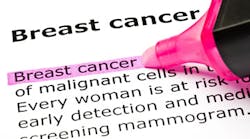Breast cancer and periodontal disease: Is there a connection?
A new study maintains that periodontal disease might increase the risk for breast cancer among postmenopausal women, particularly those who smoke. This article will review the study. (For another section in this issue of RDH eVillage Focus that discusses oral and systemic health, click here.)
There are no large studies showing the link between periodontal disease and breast cancer. However, microorganisms found in the mouth have been found in breast tumors. (1) According to one author, a vast body of evidence has found that associations among certain bacteria and cancers exist. (2) Infections involving viruses, bacteria, schistosomes (parasitic worms), and viruses have been linked to higher risks of malignant changes. (2, 3) It has been proposed that several bacteria can cause chronic infections or produce toxins that disturb the cell cycle, resulting in altered cell growth. As we know with periodontal diseases, some chronic bacterial infections stimulate immune responses that cause tissue damage (e.g., periodontal ligament, bone loss). These same type of infections can contribute to carcinogenic alterations through the stimulatory and mutagenic effects of cytokines released by inflammatory cells. (2)
READ MORE | It was a busy fall: A true story of breast cancer
Regarding oral cancer, the Human Papilloma virus (HPV) and the Epstein Barr virus (EBV) have been implicated as potential risk factors, as well fungi (e.g., Candida albicans) and certain bacteria. (4) Recent research has shown bacterial mechanisms can cause the development of oral cancer. Some examples of carcinomas related to bacteria are gastric carcinoma (Helicobacter pylori), gall bladder carcinoma (Salmonella typhi), cervical carcinoma (Chlamydia trachomatis), lung cancer (Chlamydia pneumonia), and intestinal cancer (Streptococcus bovis). (5)
The University of Buffalo Study observed over 73,000 postmenopausal women who had never had breast cancer. (1) The data was self-reported from postmenopausal participants in the Women’s Health Initiative. 26.1% of the women were found to have periodontal disease at the beginning of the study. After close to seven years, the investigators found that women with periodontal disease had a 14% higher risk of breast cancer. (1) They theorized that a systemic inflammation from periodontal disease could affect breast tissue, or that oral bacteria that enter the circulatory system could affect the tissue.
READ MORE | 14 questions to ask about a breast cancer diagnosis
“Women who had periodontal disease had a small increase in the risk of breast cancer overall,” said Jo Freudenheim, UB Distinguished Professor and interim chair of epidemiology and environmental health University at Buffalo. (6) Researchers found that among women who were smokers or who had quit smoking in the previous 20 years, those with periodontal disease had a 36% higher risk of breast cancer. (6)
As we look toward causative factors and risk factors in disease, we are seeing more studies involving bacteria and the inflammatory response.
References
1. Freudenheim JL, Genco RJ, LaMonte MJ, et al. Periodontal Disease and Breast Cancer: Prospective Cohort Study of Postmenopausal Women. Cancer Epidemiol Biomarkers Prev. 2015;12. doi: 10.1158/1055-9965.EPI-15-0750.
2. Mager DL. Bacteria and cancer: cause, coincidence or cure? A review. J Transl Med. 2006;4:14. doi: 10.1186/1479-5876-4-14.
3. Pujol FH, Devesa M. Genotypic variability of hepatitis viruses associated with chronic infection and the development of hepatocellular carcinoma. J Clin Gastroenterol. 2005,39(7):611-618.
4. Lissowska J, Pilarska A, Pilarski P, et al. Smoking, alcohol, diet, dentition and sexual practices in the epidemiology of oral cancer in Poland. Eur J Cancer Prev. 2003;12(1):25–33.
5. Chocolatewala N, Chaturvedi P, Desale R. The role of bacteria in oral cancer. Indian J Med Paediatr Oncol. 2010;31(4):126–131. doi: 10.4103/0971-5851.76195.
6. Hill DJ. Is a common form of gum disease linked to breast cancer? University of Buffalo School of Public Health and Health Professions website. http://sphhp.buffalo.edu/home/news-events.host.html/content/shared/university/news/news-center-releases/2015/12/035.detail.html. Published December 21, 2015. Accessed January 12, 2016.

